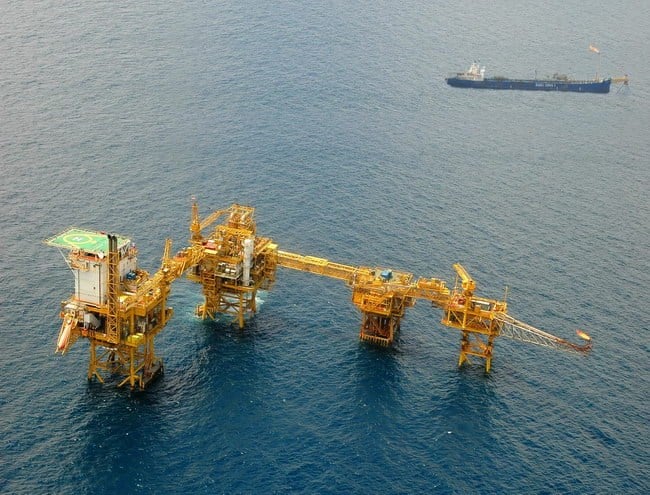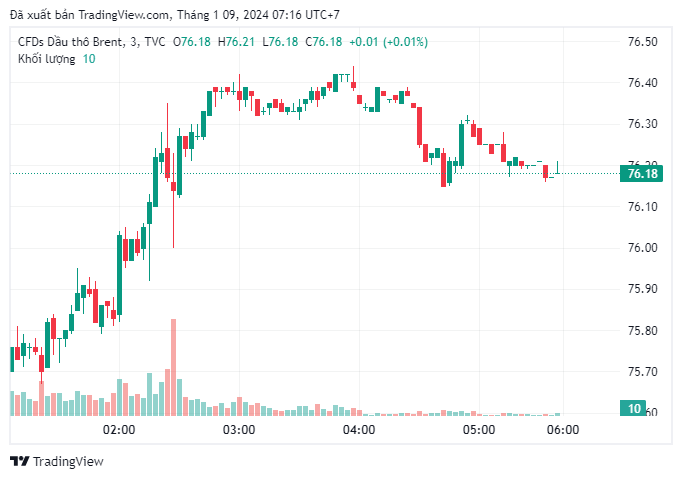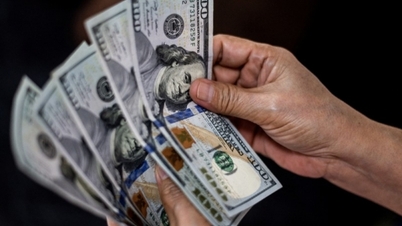
Specifically, Brent oil price decreased by 2.64 USD, equivalent to 3.4%, to 76.18 USD/barrel, while US WTI oil price closed at 70.77 USD/barrel, down 3.04 USD.
Rising supplies and competition from other producers prompted Saudi Arabia to cut its February 2024 Arab Light crude futures price to Asia by $2 to a 27-month low.
Saudi Arabia's decision to cut prices raises concerns about demand in China as well as global demand, said analyst Phil Flynn of Price Futures Group.

A Reuters survey on January 5 showed that OPEC's output increased in December 2023 due to increased production in Angola, Iraq and Nigeria, which also caused oil prices to plummet.
The increase in production comes ahead of further OPEC+ cuts in the first quarter of 2024 and Angola’s departure from OPEC this year, which will reduce output and market share in January, analysts said.
Crude oil prices should fall if we focus on factors including higher inventories, higher OPEC and OPEC+ production and lower-than-expected Saudi Arabian oil prices, said IG analyst Tony Sycamore.
Limiting the slide in oil prices was the declaration of force majeure by the Libyan National Oil Corporation at the Sharara oil field, which can produce up to 300,000 barrels per day. The force majeure took effect on January 7.
In addition, in a diplomatic effort to prevent the conflict in Gaza from spreading throughout the region, on January 8, US Secretary of State Antony Blinken held many talks with Arab leaders.
The retail price of gasoline in the country on January 9 is as follows: E5 RON 92 gasoline is not more than VND 21,186/liter; RON 95-III gasoline is not more than VND 22,148/liter; diesel oil is not more than VND 19,788/liter; kerosene is not more than VND 20,457/liter; fuel oil is not more than VND 15,685/kg.
Source


![[Photo] Readers line up to visit the photo exhibition and receive a special publication commemorating the 135th birthday of President Ho Chi Minh at Nhan Dan Newspaper](https://vphoto.vietnam.vn/thumb/1200x675/vietnam/resource/IMAGE/2025/5/17/85b3197fc6bd43e6a9ee4db15101005b)


![[Photo] Prime Minister Pham Minh Chinh chairs meeting on science and technology development](https://vphoto.vietnam.vn/thumb/1200x675/vietnam/resource/IMAGE/2025/5/17/ae80dd74c384439789b12013c738a045)

![[Photo] More than 17,000 candidates participate in the 2025 SPT Competency Assessment Test of Hanoi National University of Education](https://vphoto.vietnam.vn/thumb/1200x675/vietnam/resource/IMAGE/2025/5/17/e538d9a1636c407cbb211b314e6303fd)
























![[Photo] Nearly 3,000 students moved by stories about soldiers](https://vphoto.vietnam.vn/thumb/1200x675/vietnam/resource/IMAGE/2025/5/17/21da57c8241e42438b423eaa37215e0e)




































































Comment (0)